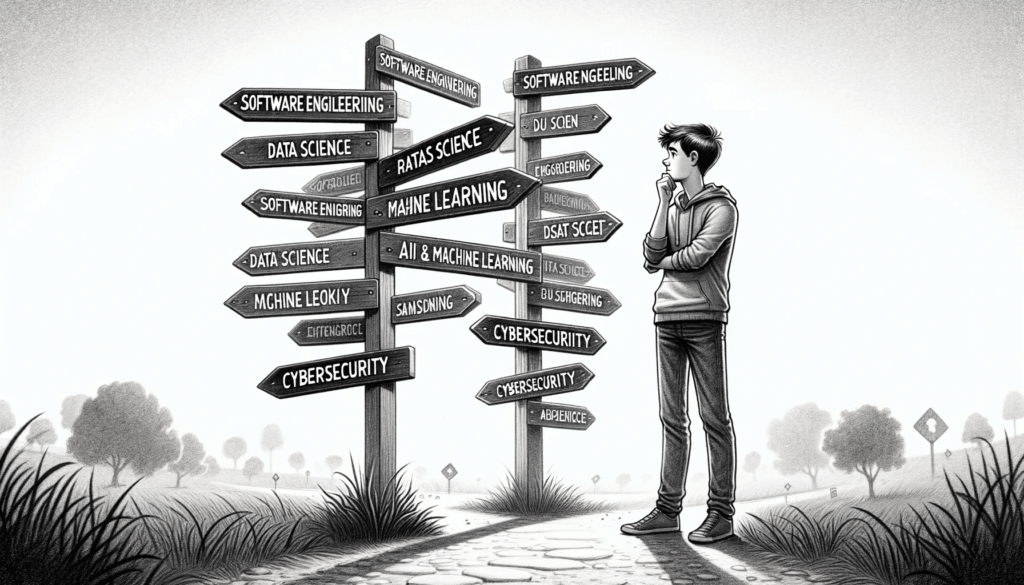Launching a career in software engineering is thrilling and challenging. With the tech industry’s rapid evolution, there’s always something new to learn and discover. Whether your passion is the complexity of algorithms, the creativity of frontend design, or the solidity of backend infrastructure, there’s a role for everyone. This guide will outline the fundamental steps to start your journey in software engineering in 2024, emphasizing how SAYGE is committed to nurturing the next generation of software engineers.
Understanding the Landscape of Software Engineering
Software engineering is vast, encompassing a range of roles from database administrators to UI/UX designers. Here’s a brief overview, along with some real-world use cases:
Frontend Developers:
Focus on the visual aspects of a website or application. They ensure that the user experience is seamless, intuitive, and aesthetically pleasing. A use case for a frontend developer could be creating a responsive and visually appealing website for a fashion retailer, where customers can easily browse and purchase products..
Backend Developers:
Work behind the scenes to ensure that data is stored, retrieved, and processed efficiently. They ensure the server, database, and application communicate effectively. In a real-world example, backend developers might design the database structure and implement server-side logic for a ride-sharing app like Uber, handling user data, ride requests, and driver assignments.
Full-stack Developers:
A hybrid of both frontend and backend, these developers have a holistic understanding of the software development process. They might build a collaborative project management platform, where they create an intuitive user interface for project teams (frontend) and develop the backend to manage tasks, timelines, and data storage efficiently.
DevOps Engineers:
They bridge the gap between development and operations, focusing on automating and optimizing the software development lifecycle. A practical use case could be a DevOps engineer working for a cloud service provider, ensuring that the platform is highly available, scalable, and secure, enabling businesses to run their applications with minimal downtime.
Data Scientists:
Harness the power of data to derive actionable insights, often using machine learning and artificial intelligence. For instance, a data scientist working for an e-commerce company might analyze customer data to build recommendation algorithms, increasing sales by suggesting personalized products to users.
While each role requires a unique skill set, some foundational skills are universally beneficial:
Essential Skills for Aspiring Software Engineers
Problem Solving:
The ability to break down complex problems and devise solutions is crucial. As a software engineer, you’re essentially a digital detective, constantly solving puzzles to make software work better and more efficiently.
Programming:
Familiarity with languages like Python, Java, JavaScript, or C++ is a good starting point. These languages serve as the building blocks of software development and can open doors to a variety of roles within the industry. Think of programming languages as your creative tools for crafting digital solutions.
Version Control:
Tools like Git help manage changes in the codebase, facilitating collaboration. Learning how to use version control effectively will make you a more efficient and organized developer. It’s like having a history book for your code, keeping track of all changes made.
Understanding of Algorithms and Data Structures:
They form the backbone of efficient software solutions. A strong grasp of these concepts enables you to optimize your code and build robust applications. Algorithms are like recipes for your software, ensuring it works efficiently and smoothly.
Communication:
In the collaborative world of software development, effective communication is key. The ability to convey your ideas, collaborate with team members, and explain your solutions is just as important as your technical skills.
SO WHERE DO YOU START?

Do Your Research: Understanding the Tech Field
Every great journey begins with a single step – and in tech, that step is research.
The tech world is vast, with each area demanding specific skills. From Web Development to Data Science, the spectrum is broad. Ask yourself, “What are the benefits of becoming a technical writer?” or “What skills are needed for Data Science?” Your answers will guide your path.
Decide Which Path to Take: Choosing Your Specialization
Transferring skills is an art.
Your current interests and skills can be a guiding light towards your ideal path. If you’re fascinated by the intricacies of design and color, like in painting, you might find a natural affinity for UI/UX Design, where aesthetics meet functionality in software development. On the other hand, if organizing and managing events captivates you, a role in Project Management within software projects could be your calling, where coordinating teams and timelines is key. Remember, the path you choose today isn’t set in stone. The software engineering field is dynamic and allows for growth and transition. Start with what aligns with your skills and interests now, and be open to evolving your career as you discover new aspects of this multifaceted domain.
Pursue Foundational Education: Building the Base
Your educational path is your blueprint.
Weigh your options: traditional computer science programs, intensive bootcamps, or the flexibility of online courses like GitHub. Delve into algorithms, data structures, and software design. This solid base will anchor your future endeavors.
Master Core Programming Languages: Key to Proficiency
Languages are the tools of your trade.
Choose a language aligned with your goals. Dive into its syntax, libraries, and best practices. Build small projects, like those on Stack Overflow, to solidify your skills. Learning multiple languages broadens your horizons.
Get Hands-On Experience: From Theory to Practice
Practice makes perfect.
Start with personal projects. Challenge yourself with complex tasks. Embrace version control and collaboration. This practical experience is your stepping stone into the professional world.
Gain Certifications and Credentials: Enhancing Employability
Your certificate is your passport.
In the dynamic field of software engineering, certifications are more than just paper; they’re proof of your expertise. Research and attain industry-recognized certifications. This isn’t just about adding a line to your resume; it’s about staying relevant in a rapidly evolving field.
Network to Kickstart Your Career: Building Professional Relationships
Connections can be your greatest asset.
Engage with online communities and local meetups. Your network isn’t just about who you know; it’s about who knows you. Showcase your skills and achievements in an online portfolio. Remember, your network is a gateway to new opportunities. Learn more about effective networking in software development through this insightful article.
Applying for Jobs: The Final Leap
It’s time to take the plunge.
Craft a stellar resume that highlights your skills and qualifications. Attend job fairs and utilize platforms like LinkedIn for job applications. This step is all about persistence and perseverance. Keep applying and refining your approach.
Best Free Learning Sources For Software Engineers In 2024
Knowledge is like an open-source code – readily available and just waiting to be tinkered with! As you start your engineering journey, think of these resources as your personal toolbox. Sure, you might hit a few ‘404 – Knowledge Not Found’ moments, but remember, every great engineer started with a single line of code.
So, gear up, get your geek on, and dive into the vast sea of free knowledge. The only investment? Your curiosity and a dash of internet wizardry! 🚀💻🛠️
| SOURCE | WHAT YOU WILL LEARN |
|---|---|
| FreeCodeCamp | A platform offering coding resources, exercises, and certifications in web development. |
| GitHub Learning Resources | Offers various free learning resources and also collaborative projects. |
| Coursera’s Introduction to Computer Science by Harvard | Comprehensive course on computer science basics, free to audit. |
| Udacity’s Intro to HTML and CSS | A self-paced course for beginners on HTML and CSS. |
| Python for Beginners by Simplilearn | Covers the basics of Python, suitable for beginners and data science enthusiasts. |
| OpenLearn’s Learn to Code for Data Analysis | Course focused on data analysis and programming. |
| Pluralsight | Offers thousands of topic-based training courses designed by industry experts in software development, IT, and cybersecurity. |
| Codecademy | Easy-to-use platform with a range of free courses in front-end and back-end languages for beginners. |
| The Odin Project | A full stack curriculum maintained by volunteers, ideal for web development learning from beginner to advanced levels. |
| Udemy | Offers a variety of software engineering courses including Java, Spring, and Python, with some free options available. |
| Stack Overflow | A Q&A platform for software developers to share technical knowledge and solve problems collaboratively. |
| React | Provides tutorials and documentation for learning React, a JavaScript library for building user interfaces. |
| edX | Offers a wide range of online courses and programs in software engineering, in partnership with leading universities. |
| Roadmap.sh | Provides tailored guides and roadmaps for various developer roles, including DevOps, front-end, and back-end. |
| Pramp | A tool for practicing technical, behavioral, and system design interviews online, ideal for software engineering roles. |
| University of Pennsylvania | Offers a course in software development fundamentals, focusing on Java application design and development. |
| MIT OpenCourseWare | Provides free courses in computer science and software engineering, including machine learning with Python. |
| Stanford Online | Offers a variety of free computer technology courses, including Computer Science 101 and Algorithms. |
| Smashing Magazine | Publishes articles on coding, design, and software development careers for web designers and developers. |
| Software Development Times (SD Times) | Offers articles and informational webinars on various topics in software development. |
FAQs
Q: What’s the best way to gain practical experience in software engineering?
A: Start with small personal projects and gradually take on more complex ones. Websites like GitHub offer a plethora of resources to help you begin.
Q: How important are certifications in software engineering?
A: Certifications are highly valuable as they provide tangible proof of your skills and knowledge. They are especially useful when transitioning into new areas of software engineering. For more insights on choosing between Software Development and Operations sides for example, check out this article.
Q: Can I switch specialties within software engineering?
A: Absolutely! Software engineering is a flexible field. Many professionals start in one area, like frontend development, and then transition to others like backend development over time.
Conclusion: Embarking on Your Software Engineering Journey

You’re now equipped with the knowledge and steps to kickstart your software engineer career in 2024. Embrace each stage with enthusiasm and dedication. Your journey in tech is not just about reaching a destination; it’s about the growth and experiences you gather along the way.
Embarking on a software engineering career is an exciting journey filled with opportunities for growth and innovation. Whether you’re interested in frontend, backend, or any other niche within the field, building a solid foundation of skills and understanding the diverse roles in software engineering is the key to success.
At SAYGE, we are dedicated to mentoring and guiding the next generation of software engineers, providing invaluable support for those looking to thrive in this dynamic industry. With the right skills and knowledge, you can confidently take your first steps into the world of software development, where every line of code you write brings your creative ideas to life and contributes to the ever-evolving tech landscape. It’s a journey worth taking, and we’re here to help you along the way.




